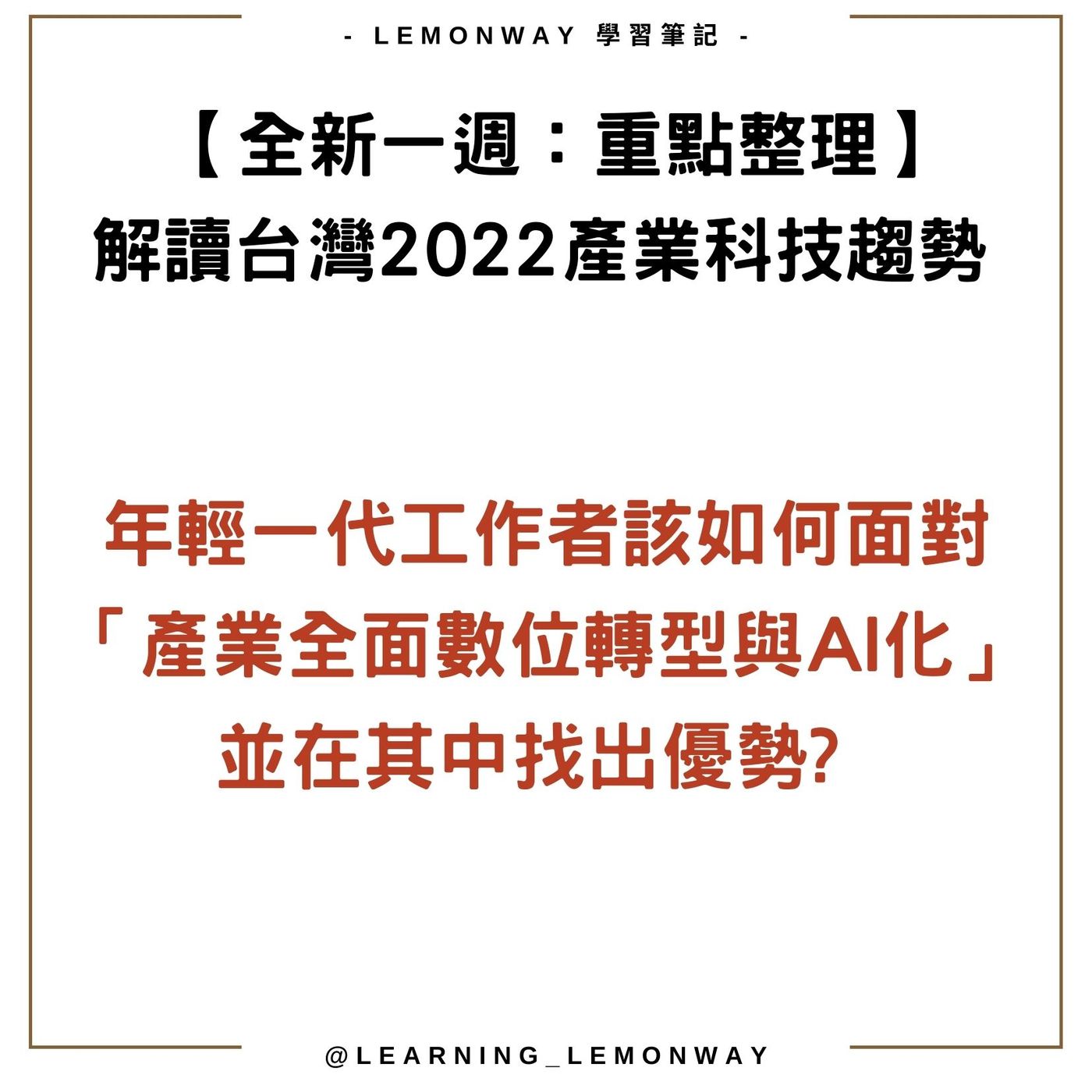
台大化工所 | Podcast 一百種檸檬味 喜歡閱讀、學習新事物。 粉專內容 : 閱讀心得/ 區塊鏈知識/ 解決問題 我的平台:https://linktr.ee/Lemonway_Learning Telegram推薦文章、書籍:https://t.me/lemonwaylearning
【How should the younger generation of workers face the comprehensive digital transformation and AI transformation of Taiwan's industries and find their advantages? 】

After listening to a new week of new Podcasts today, the host invited Jian Lifeng, former general manager of google and current director of Ikala and Appier, to discuss Taiwan's industry trends after digital transformation and AI.
I have compiled some key points of industry trends, which may be the focus of Taiwan's development in the next five years, to share with you:
1. Ikala CEO Cheng Shijia mentioned in the last episode that Taiwan's cloud function service industry this year has a compound growth rate of 30%.
This is mainly related to the acceleration of the epidemic last year. Taiwan currently has an annual output value of 10 billion related companies, and most of them come from the "manufacturing and semiconductor industry": Because of remote work, the data of hardware companies gradually needs to be transferred to the cloud.
2. Taiwan's 2C-end enterprises, cloud and data systems are considered mature, and the enterprises in the front have been running for nearly 10 years;
In contrast, hardware 2B-end enterprises have just started, which means that in the future, the demand for AI and cloud-related industries in the manufacturing industry will be very strong. It should be beneficial for talents in this area: combining engineering background and programming ability.
3. The trend for Taiwanese enterprises to go to the cloud has been established, entering the era of digital economy (enterprises are beginning to see the advantages of using data to optimize their operations). The FSC began to require every company to have a Chief Financial Officer.
For example, TSMC has incorporated AI to optimize the overall process to improve yield, and AI image recognition technology has also accelerated factory automation in the electronics manufacturing industry (such as ASE, Quanta).
4. Enterprises can use AI to help four aspects: customers (such as 2C's Marktech), products, production processes (AI optimizes processes), and employees (with the help of data and automated work, employee productivity can be greatly improved).
5. Blue-collar jobs are about to be largely replaced by AI: (For example, the logistics industry is short of drivers, which will soon be replaced by automation: autonomous driving). This may be good news for Taiwan, which is about to face a large number of job shortages in an aging society in the future.
6. In the future, AI may further replace the white-collar class, if this type of work does not require too strong domain knowledge. The demand for civil servants who may have a high degree of duplication of work will be reduced.
【in conclusion】
Young people in the future need to think more about what advantages do we have based on powerful software technology? (Cross-field is very important). When we can use AI to improve personal productivity, our personal dividends will be higher and the relative competition will be higher.
- If you want to know more content, welcome to keep track and update!
- Be my appreciative citizen and help me go further by sponsoring a cup of coffee every month. https://liker.land/william53241/civic?utm_source=dashboard&utm_medium=app&utm_campaign=sponsor_link_cta
- Lemonway daily study notes FB fan: https://www.facebook.com/profile.php?id=100055469826072
- Lemonway daily study notes IG fan: https://www.instagram.com/learning_lemonway/
- If you want to cooperate, you can come to me here: william5324144@gmail.com
- Join me to share the blockchain article on Telegram: https://t.me/lemonwaylearning
Like my work?
Don't forget to support or like, so I know you are with me..
Comment…